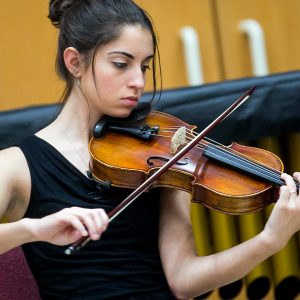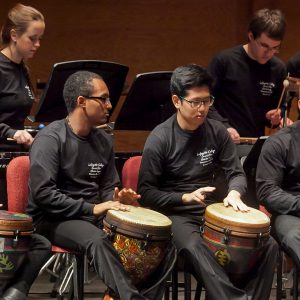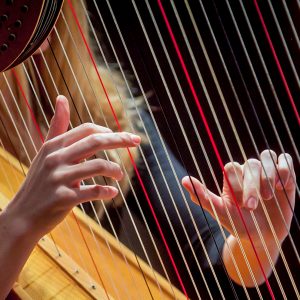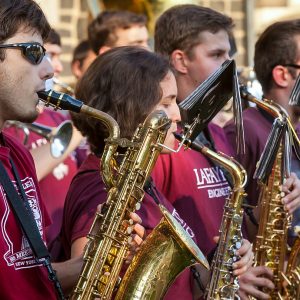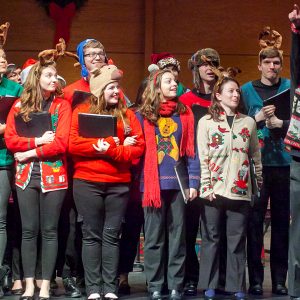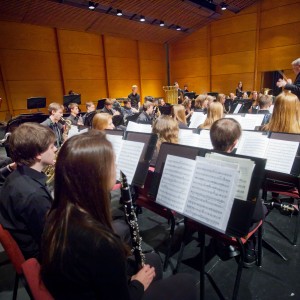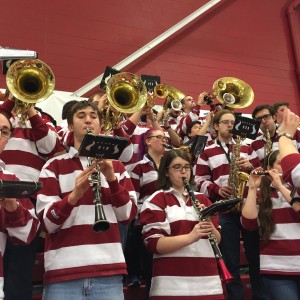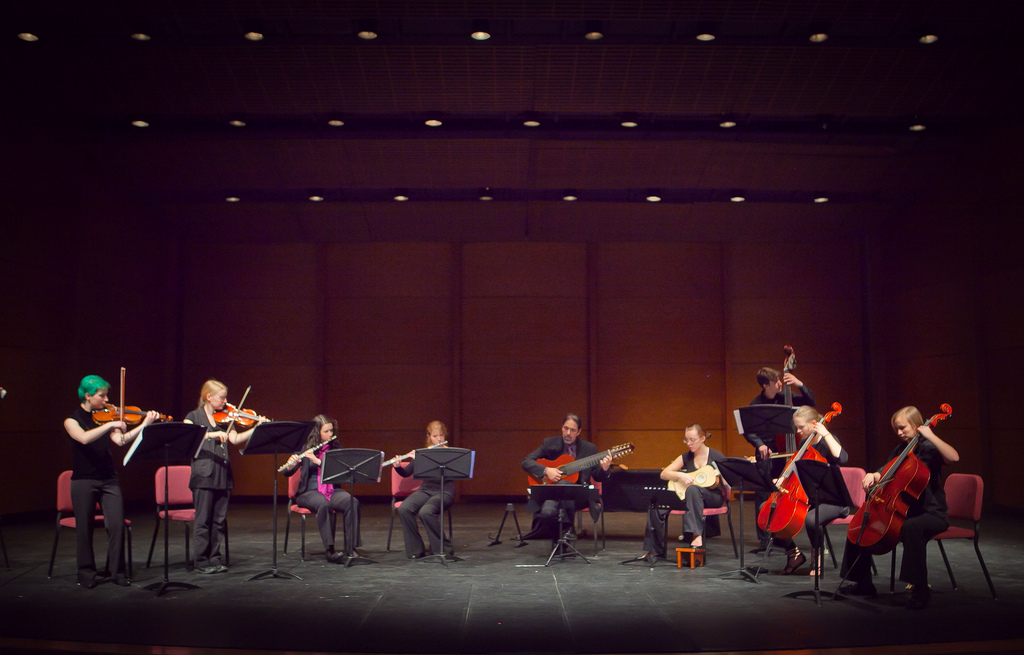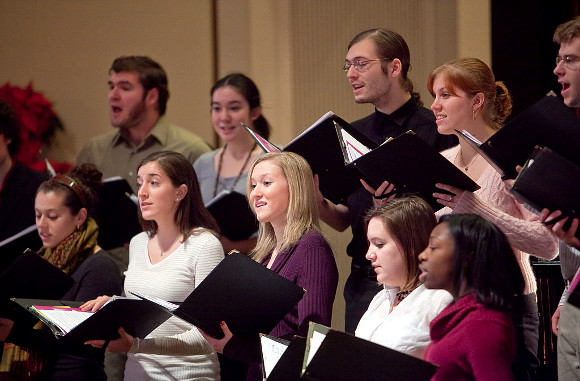Program for Majors & Minors
The Department of Music at Lafayette College is committed to the study of music as an important element of a truly excellent liberal arts education.
A primary goal is to offer students—regardless of their major field of study and whatever their career goals might be—the opportunity and means to experience music emotionally and intellectually. We address this goal with an interdisciplinary approach by offering a wide variety of courses in the four principal areas of music—music history and literature, music theory and analysis, performance, and composition. These courses and performance activities provide our students with a solid foundation in these traditional areas of music study. We encourage students to pursue their individual musical interests and to explore and enjoy music in its infinite variety to whatever extent they are capable.
Many students develop their own course of study, and truly exceptional students are encouraged to participate in the development and implementation of the music program by assisting in classes, the electronic music lab, and ensembles. The world of professional music is extremely competitive today, but interesting and rewarding opportunities do exist for those with the motivation, talent, and preparation to succeed.
Students with a strong interest in music may choose the bachelor of arts degree in music or elect a minor in either music or music technology. Both curricula can lead to a career in music, and, when combined with other interests or majors, open up a wealth of music-related career opportunities, such as music journalism, arts management, recording engineering, arts medicine, or music therapy. Many former students have continued to realize their potential in graduate school, the performing world, and a host of rewarding careers involving music.
We are dedicated to providing a wide variety of musical experiences for all interested students. We strongly encourage everyone to continue to build upon previous musical experiences and to develop new ones. We offer numerous opportunities to perform (choir, jazz ensemble, wind and string ensembles, percussion, or world music), to compose, to study music in a historical context, and to explore music technology. Interested singers and instrumentalists also have the opportunity to study privately with some of the finest artist-teachers anywhere, from beginning through advanced levels. The curriculum includes offerings in theory, performance, composition, history, literature, and criticism. In addition to the more traditional offerings, students can explore jazz styles, world music traditions (Africa, China, Japan, India, Indonesia), and electronic composition.
Requirements for the Major in Music
MUS 103: Introduction to World Music Traditions —OR— MUS 101: History, Culture, Context
MUS 121: Music Theory I (or Theory Elective for those who are exempted)
MUS 222: Music Theory II
MUS 323: Music Theory III
MUS 201: Music History and Literature, 1600-1900
MUS 202: Music History and Literature, 1900-
—OR—
MUS 324: 20th Century Harmonic Practice
1 Musicology Elective (above the 300 level)
MUS 491 or MUS 492 (capstone, one semester)
—OR—
MUS 495 and MUS 496 (Honors Thesis, two semesters)
4 Semesters of Ensemble
4 Semesters of Lessons on the Primary (Ensemble) Instrument or Voice (MUS 141)
Requirements for the Minor in Music
MUS 103: Introduction to World Music Traditions
MUS 121: Music Theory I (or Theory Elective for those who are exempted)
MUS 222: Music Theory II
MUS 201: Music History and Literature, 1600-1900
1 Music Elective (above the 200 level)
2 Semesters of Ensemble
2 Semesters of Lessons on the Primary Instrument or Voice (MUS 141)
Requirements for the Minor in Music Technology
MUS 101 Music, Culture, Context
MUS 121 Music Theory I
MUS 104 Music Technology I
MUS 204 Music Technology II
One course from among CS104 Introduction to Game Programming, CS105 Digital Media Computing, OR ECE211 Digital Circuits
2 semesters of Private Lessons (.25 unit each)
2 semesters of Ensembles (.25 unit each)
A Typical Music Major Schedule of Courses
The schedule below is common, but by no means mandatory. The Music Major is quite flexible, and allows for the exploration of many musical and non-musical topics. Your Music advisor will help you find your path.
We do, though, recommend beginning music courses early in your career at Lafayette. Completing the fundamental courses early allows you more time to study advanced or esoteric concepts. Serious music students should also plan on trying to take lessons on their ensemble instrument every semester of their residence.
First Year
Fall
FYS
MUS 103: Introduction to World Music Traditions —OR— MUS 101: History, Culture, Context
MUS 222: Theory II (with approval) or music elective
CCS Elective
MUS 140: Lessons
Ensemble(s)
Spring
MUS 121: Music Theory I —OR— MUS 323: Music Theory III
CCS or Music Elective
CCS Elective
CCS Elective
MUS 141: Lessons
Ensemble (s)
Sophomore
Fall
MUS 222: Music Theory II (if not taken in year 1) or Music Elective
Music Elective
MUS 201: Music History and Literature, 1600-1900
CCS Elective
CCS Elective
MUS 141: Lessons
Ensemble(s)
Spring
MUS 323: Music Theory III (if not already taken) or Music Elective
CCS Elective
CCS Elective
MUS 141: Lessons
Ensemble(s)
Junior
Fall
MUS 324: 20th Century Harmonic Practice
—or— MUS 202: Music History and Literature, 1900-
Musicology Elective
CCS Elective
CCS Elective
MUS 141: Lessons
Ensemble(s)
Spring
Any remaining courses not already taken
Music Electives
MUS 141: Lessons
Ensembles
Senior
Fall
Any remaining courses
Music Electives
MUS 491 (Senior Capstone)* —OR— MUS 495 (Honors Thesis)
Spring
Any remaining courses
Music Electives
MUS 492 (Senior Capstone)* —OR— MUS 496 (Honors Thesis)
*The Senior Capstone is a one-semester project that can be completed in either the fall or spring semester; Honors Thesis projects are completed over both semesters.
